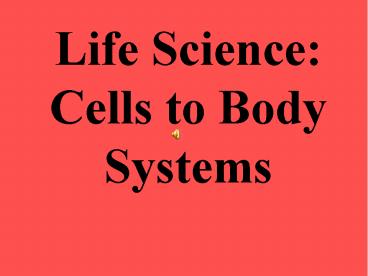Life Science: Cells to Body Systems - PowerPoint PPT Presentation
Title: Life Science: Cells to Body Systems
1
Life Science Cells to Body Systems
2
Cells
- Simple organisms such as bacteria, are single
cell. - Plants and animals are made up of many cells.
- Each kind of cell has a particular function.
3
Cells Size Shape
- Size and Shape depend upon its function.
- Red blood cells are small and disc shaped to fit
through the smallest blood vessel. - Muscle cells are long and thin. When they
contract they produce movement. - Nerve cells which carry signals to the brain are
very long.
4
Functions of Cells
5
Tissues, Organs, Systems
- Cells that work together to perform a specific
function form a tissue. - Just as cells that work together form a tissue,
tissues that work together form an organ. - Organs that work together to perform a function
form a system. Example circulatory system. - Plant cells also form tissues, such as the bark
of a tree. And plant cells work together, forming
organs, such as roots and leaves. - Homeostasis-the maintenance of a constant
internal state in a changing environment (body
temperature).
6
Systems Working Together
7
The Muscular System
- Voluntary Muscles move bones and hold your
skeleton upright. - Smooth Muscles contract slowly and move
substances through the organs they surround. - Cardiac Muscles make up the walls of the heart.
Their function is to pump blood.
8
The Immune System
- The immune system is the cells and tissues that
recognize and attack foreign substances. - Pathogens must first attack, but many have
trouble getting through the first lines of
defense of your body (our skin). - When skin is cut pathogens can get in the body,
but our body acts fast to fight the pathogens by
sealing off the wounded area. - When pathogens do manage to get in many are
engulfed and digested by macrophages. - T cells and B cells are the next line of defense.
T cells coordinate the immune system and attack
many infected cells. B cells make the antibodies. - Many organisms that enter the eyes and mouth are
destroyed by special enzymes. - Fever helps speed immune-cell growth and slow
pathogen growth.
9
The Digestive System
- Digestion begins as you chew food.
- Glands in your mouth produce saliva to moisten
food. - The food passes through the esophagus to the
stomach and moves to the small intestine. - Nutrients diffuse through the villi, tiny
projections from the intestine, into the blood.
10
The Excretory System
- The function of the excretory system is to remove
wastes from the body. - Cell wastes include carbon dioxide and ammonia.
- The kidneys, ureters, bladder, and urethra make
up the excretory system. - The body also removes wastes through sweating.
Sweat is a salty liquid that evaporates from the
skin.
11
The Respiratory System
- Air enters the body through nasal passages is
filtered, then travels down the trachea. - The trachea branches into two tubes called
bronchi, which lead to the lungs. - At the end of the bronchi are tiny tubes called
aveoli, small air sacs. - Carbon dioxide and oxygen are exchanged in the
aveoli and the oxygen rich blood enters the body
through the pulmonary veins.
12
The Circulatory System
13
The Nervous System
- The nervous system connects all the tissues and
organs to your brain. - It consists of two parts The central nervous
system and peripheral nervous system. - The central nervous system consists of brain and
spinal cord. - The peripheral nervous system consists of sensory
organs, such as eyes, ears and body nerves.
14
THE END!!!
Any Questions?

